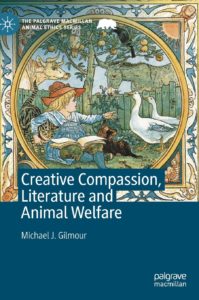Latest news
Press Release: Literature is a Strategic Resource in Humane Education, claims Academic
9th December 2020
 Canadian professor of English and biblical literature Michael J. Gilmour argues that fiction contributes much toward humane education.
Canadian professor of English and biblical literature Michael J. Gilmour argues that fiction contributes much toward humane education.
“Animal-friendly storytellers and poets undermine entrenched dominative attitudes toward the nonhuman. They bring animals from the margins to the centre, and in doing so urge a broadening of our understanding of community and inclusivity.”
These claims are made in Gilmour’s latest book Creative Compassion, Literature and Animal Welfare recently published by Palgrave Macmillan in their Animal Ethics book series. He is also a Fellow of the Oxford Centre for Animal Ethics.
Gilmour considers the enormous potential of advocacy-inclined fiction. He says: “Defenders of animals often identify books as formative influences. Jane Goodall, for one, writes of Edgar Rice Burroughs’s Tarzan stories nourishing her childhood fascination with and love for animals. Richard Adams of Watership Down fame credits Hugh Lofting’s Doctor Dolittle adventures for his turn toward advocacy.”
He continues: “Human-caused animal suffering tends to be hidden from view. The illegal, and therefore clandestine cockfight. The No Trespassing sign at the factory farm. The restricted access laboratory. The wounded deer deep in the forest, left with a lingering injury from a hunter’s bullet. But writers take us to such lonely places and allow us to see the often-unseen consequences of human actions.”

Professor Michael J. Gilmour
“Fiction is thus an education on the need for protectionist efforts, affording occasions to ‘meet’ cows facing slaughter or lab mice enduring surgeries. Through stories, we experience the foxhunt from the vixen’s point of view, and we see zoos through the eyes of those who once roamed free but now languish in cages. Such exercises of the imagination potentially disrupt habitual indifference and awaken compassion.”
Centre Director Professor Andrew Linzey commented: “We need to dig deep into the causes of humane and inhumane treatment of animals, including literature. We should congratulate Professor Gilmour on his excellent work.”
The book is available to order from Palgrave Macmillan here.
Notes for editors
- Professor Michael J. Gilmour teaches English literature and New Testament at Providence University College (Manitoba). His previous book is Animals in the Writings of C. S. Lewis. He can be contacted at gilmour@prov.ca
- The book is published as part of the Palgrave Macmillan Animal Ethics book series of which more thirty volumes have already been published.
- The Oxford Centre for Animal Ethics is an independent centre pioneering ethical perspectives on animals through academic research, teaching, and publication. The Centre comprises more than 100 academic Fellows who aim to help people think differently about animals.